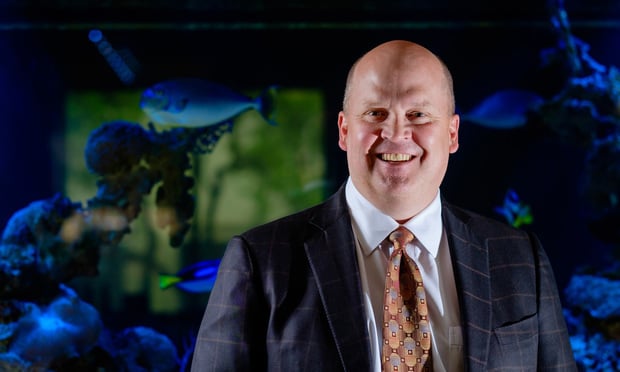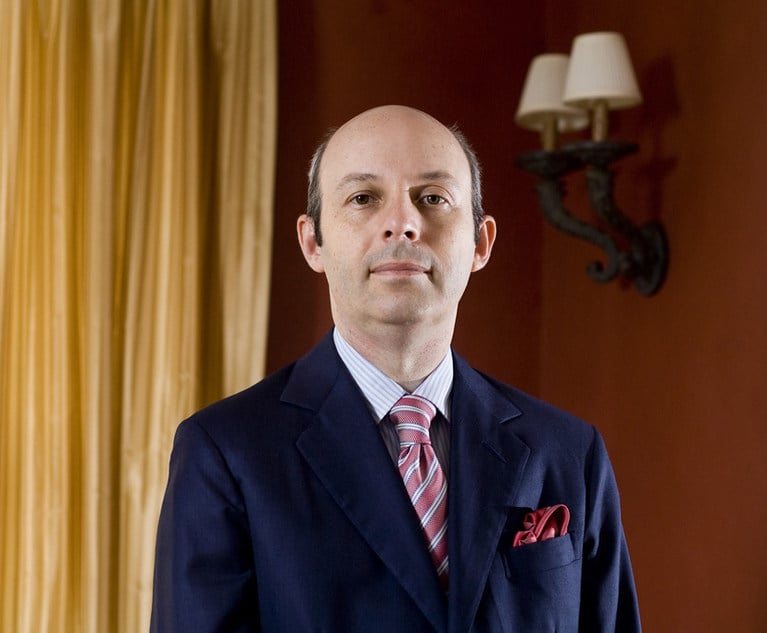Mikal Watts Wants One-Third of Expected $500M Fee in Corn Settlement
Texas plaintiffs attorney Mikal Watts is asking for at least $150 million in legal fees from the $1.5 billion settlement with Syngenta AG, citing his firm's “unique position in this litigation.”
August 06, 2018 at 08:11 PM
6 minute read
 Mikal Watts, partner at Watts Guerra. Photo: Mark Sobhani Photography
Mikal Watts, partner at Watts Guerra. Photo: Mark Sobhani Photography
Texas plaintiffs attorney Mikal Watts is asking for at least $150 million in legal fees from the $1.5 billion settlement with Syngenta AG, citing his firm's “unique position in this litigation.”
The Watts Guerra attorney's fee request, filed last month but updated on Aug. 3, sets up a potential clash over what could be an estimated $500 million in fees in the class action settlement, which resolves claims by more than 600,000 farmers who alleged Syngenta sold genetically modified corn seed that China refused to import, causing farmers to lose billions of dollars. In a separate request for fees, lead counsel in the federal multidistrict litigation in Kansas are seeking that amount—about 33 percent of the total settlement fund.
“This fee request is based on Watts Guerra's enormous investment in this litigation,” Watts wrote in his motion. “It is on the high end of the range, perhaps, but not unprecedented.”
Watts claims to represent 57,000 farmers who could be entitled to between $345 million and $750 million under the settlement.
Watts did not respond to a request for comment.
The requests come as at least four other lawyers have challenged the fees in the deal, particularly those going to Watts. Oppositions to the fee requests are due Aug. 17.
Chris Seeger of New York's Seeger Weiss, a member of the plaintiffs' settlement negotiation team, along with Watts and Patrick Stueve of Kansas City, Missouri-based Stueve Siegel Hanson, co-lead and liaison counsel of federal multidistrict litigation, did not respond to requests for comment.
The Syngenta litigation was coordinated in both federal multidistrict litigation in Kansas and in two proceedings in Minnesota and Illinois state courts. In their fee request, the lead lawyers in Syngenta want 50 percent of the $500 million, plus about $6.7 million in costs and expenses, which would go to a total 44 law firms. They want another 12.5 percent to go to the lead lawyers in the Minnesota state court, and 17.5 percent to attorneys in Illinois state court. The remaining $100 million would be reserved for other lawyers.
The dispute mirrors fee fights that have erupted in mass torts between plaintiffs attorneys appointed to represent members of a class action and those who have brought individual suits on behalf of their clients. The vast majority of the farmers Watts represents have retainer agreements with him and filed individual suits in Minnesota state court.
Last year, as part of the federal multidistrict litigation, a jury awarded $217.7 million to a class of Kansas farmers in the first bellwether trial. It was one of eight subclasses of farmers planned for trials. A second, on behalf of Minnesota farmers, was ongoing when both sides struck a deal.
Watts Guerra partner Francisco Guerra was co-lead plaintiffs counsel in Minnesota state court, but no one from the firm had a lead role in the federal multidistrict litigation. The firm did work on the Minnesota trial, however, and Watts was one of four lawyers appointed to the plaintiffs' negotiating committee.
“That trial forced Syngenta finally to accept that it faced not just hundreds of millions of dollars in compensatory damages but a likely multibillion-dollar judgment based on intentional misconduct—for the farmers in a single state,” Watts wrote. “Then, in an instant, it was over.”
The initial settlement called for two agreements—one on behalf of the class, and one on behalf of the individual plaintiffs, according to court filings. But the negotiated deal encompassed four subclasses—two on behalf of farmers, one for grain handling facilities and another for ethanol producers.
Final approval of the settlement is set for Nov. 15.
Earlier this year, two attorneys in Beaumont, Texas, claiming to represent 9,000 farmers filed a motion to delay approval of the settlement, insisting the lead lawyers who negotiated the deal kept their clients in the dark on “how the settlement would be divided and distributed between the class actions and the individual producer plaintiffs.” In particular, they claimed Watts and another lawyer on the plaintiffs settlement negotiation committee, Clayton Clark of Clark, Love & Hutson in Houston, dropped a more favorable settlement for farmers with individual lawsuits in exchange for higher fees.
Another lawyer, D. Allen Hossley of Hossley & Embry in Tyler, Texas, who claimed to represent 650 farmers, joined the motion, filed by Mitchell Toups, of Weller, Green, Toups & Terrell and Richard Coffman of The Coffman Law Firm (Toups and Coffman are now seeking $34 million in fees, while Hossley wants nearly $2.7 million).
On April 24, Minneapolis attorney Doug Nill sued Watts. He claimed Watts, firm partner Guerra and Jon Givens, of counsel, who lives in Alaska, and 13 other small law firms or solo practitioners conspired to convince 60,000 farmers not to participate in the class action, and now could end up with $200 million in fees. The suit asked to void the retainer agreements, which included a contingency fee rate of 40 percent.
In his fee request, Watts said he would drop his contingency fee to 33.3 percent. When accounting for what he had agreed to pay lead lawyers in the federal multidistrict litigation—referred to as a common benefit assessment—his contingency fee would drop to less than 24.2 percent, he wrote.
But, anticipating that “some of the other common benefit counsel” may demand one-third of the settlement for themselves, he insisted that his fees come out of the $500 million and that he get reimbursed for the $12.8 million in common benefit expenses he paid in the Minnesota state court litigation. He cited a 2015 joint prosecution agreement that was designed to resolve future fee disputes among lawyers in both the Minnesota state court cases and federal multidistrict litigation.
Watts backed up his fee request, which also includes 332 law firms that worked on his cases, with expert reports from six prominent legal scholars, including Brian Fitzpatrick of Vanderbilt Law School and Geoffrey Miller of New York University School of Law.
It's not the first time Watts has faced scrutiny. Federal prosecutors indicted him on charges that he submitted phony clients to recover damages from the Deepwater Horizon oil spill in 2010. A federal jury acquitted him in 2016.
This content has been archived. It is available through our partners, LexisNexis® and Bloomberg Law.
To view this content, please continue to their sites.
Not a Lexis Subscriber?
Subscribe Now
Not a Bloomberg Law Subscriber?
Subscribe Now
NOT FOR REPRINT
© 2025 ALM Global, LLC, All Rights Reserved. Request academic re-use from www.copyright.com. All other uses, submit a request to [email protected]. For more information visit Asset & Logo Licensing.
You Might Like
View All
Texas-Based Ferguson Braswell Expands in California With 6-Lawyer Team From Orange County Law Firm
2 minute read

Crypto Entrepreneur Claims Justice Department’s Software Crackdown Violates US Constitution
4 minute read
SCOTUSblog Co-Founder Tom Goldstein Misused Law Firm Funds, According to Federal Indictment
2 minute readTrending Stories
- 1How ‘Bilateral Tapping’ Can Help with Stress and Anxiety
- 2How Law Firms Can Make Business Services a Performance Champion
- 3'Digital Mindset': Hogan Lovells' New Global Managing Partner for Digitalization
- 4Silk Road Founder Ross Ulbricht Has New York Sentence Pardoned by Trump
- 5Settlement Allows Spouses of U.S. Citizens to Reopen Removal Proceedings
Who Got The Work
J. Brugh Lower of Gibbons has entered an appearance for industrial equipment supplier Devco Corporation in a pending trademark infringement lawsuit. The suit, accusing the defendant of selling knock-off Graco products, was filed Dec. 18 in New Jersey District Court by Rivkin Radler on behalf of Graco Inc. and Graco Minnesota. The case, assigned to U.S. District Judge Zahid N. Quraishi, is 3:24-cv-11294, Graco Inc. et al v. Devco Corporation.
Who Got The Work
Rebecca Maller-Stein and Kent A. Yalowitz of Arnold & Porter Kaye Scholer have entered their appearances for Hanaco Venture Capital and its executives, Lior Prosor and David Frankel, in a pending securities lawsuit. The action, filed on Dec. 24 in New York Southern District Court by Zell, Aron & Co. on behalf of Goldeneye Advisors, accuses the defendants of negligently and fraudulently managing the plaintiff's $1 million investment. The case, assigned to U.S. District Judge Vernon S. Broderick, is 1:24-cv-09918, Goldeneye Advisors, LLC v. Hanaco Venture Capital, Ltd. et al.
Who Got The Work
Attorneys from A&O Shearman has stepped in as defense counsel for Toronto-Dominion Bank and other defendants in a pending securities class action. The suit, filed Dec. 11 in New York Southern District Court by Bleichmar Fonti & Auld, accuses the defendants of concealing the bank's 'pervasive' deficiencies in regards to its compliance with the Bank Secrecy Act and the quality of its anti-money laundering controls. The case, assigned to U.S. District Judge Arun Subramanian, is 1:24-cv-09445, Gonzalez v. The Toronto-Dominion Bank et al.
Who Got The Work
Crown Castle International, a Pennsylvania company providing shared communications infrastructure, has turned to Luke D. Wolf of Gordon Rees Scully Mansukhani to fend off a pending breach-of-contract lawsuit. The court action, filed Nov. 25 in Michigan Eastern District Court by Hooper Hathaway PC on behalf of The Town Residences LLC, accuses Crown Castle of failing to transfer approximately $30,000 in utility payments from T-Mobile in breach of a roof-top lease and assignment agreement. The case, assigned to U.S. District Judge Susan K. Declercq, is 2:24-cv-13131, The Town Residences LLC v. T-Mobile US, Inc. et al.
Who Got The Work
Wilfred P. Coronato and Daniel M. Schwartz of McCarter & English have stepped in as defense counsel to Electrolux Home Products Inc. in a pending product liability lawsuit. The court action, filed Nov. 26 in New York Eastern District Court by Poulos Lopiccolo PC and Nagel Rice LLP on behalf of David Stern, alleges that the defendant's refrigerators’ drawers and shelving repeatedly break and fall apart within months after purchase. The case, assigned to U.S. District Judge Joan M. Azrack, is 2:24-cv-08204, Stern v. Electrolux Home Products, Inc.
Featured Firms
Law Offices of Gary Martin Hays & Associates, P.C.
(470) 294-1674
Law Offices of Mark E. Salomone
(857) 444-6468
Smith & Hassler
(713) 739-1250






